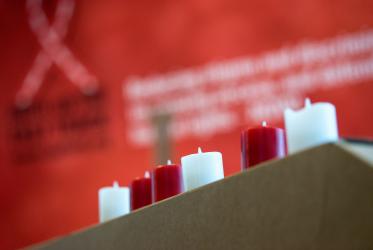Trained by the World Council of Churches (WCC) programme Ecumenical HIV and AIDS Initiatives and Advocacy (EHAIA), church leaders and activists in Kenya are working hard to address HIV and AIDS. They focus on HIV prevention measures, accessibility to the treatment and most importantly eliminating the discrimination and stigma attached to HIV, prevalent even within church communities.
According to last year’s estimates from UNAIDS, the, number of people living with HIV in Kenya was around 1,400,000, with 33,000 deaths caused by HIV. Women aged 15 and up living with HIV numbered 700,000, and 650,000 children became orphans in the country due to HIV and AIDS, in year 2014 alone.
The accessibility to medication for HIV is a challenge for many in Kenya.
Peter Kangethe, a lay leader from the African Orthodox Church of Kenya and a pharmacist, says that in the 1990s the price of medication for HIV was as high as 1,000 US dollars.
“It was very difficult for me as a pharmacist to tell people the high price of such medication, knowing they probably could not afford it,” said Kangethe. With advocacy spanning over the years, the number of people receiving the treatment has gradually increased, he said, yet more needs to be done.
Women are known to be most affected by HIV and AIDS. Kangethe shares that it is “not easy to address HIV from a gender-based perspective”, especially from church platforms. Yet he believes that with encouragement from church leaders and assertiveness from women themselves, questioning patriarchal patterns, the churches can support those affected by the pandemic.
“Women are given less opportunities in terms of education, economic independence and freedom. This is something we have been able to challenge with EHAIA training. The contextual Bible studies, analysis of the concept of masculinity and gender, have helped bring women to the forefront in dealing with HIV, speaking out and taking charge of their own health and healing,” says Kangethe.
Emily Wairimu, HIV counsellor at a Kenyan NGO called Comfort the Children International, is among such women who have made a difference. An HIV positive person herself, Wairimu was trained for advocacy by EHAIA and has been deeply involved for many years in raising awareness about HIV and AIDS.
“There are many misconceptions about HIV. Some people think that having sex with a minor can cure HIV. This has increased sexual assaults on children. In some churches, people have been told that prayer is enough to cure HIV, making them ignore proper HIV treatment,” Wairimu shares.
She adds that the risk of spreading HIV is prevalent despite the best of interventions. Women, children, people with mental ailments and drugs and substance users are vulnerable and can be drivers of HIV.
Wairimu admits a “lot of denial and stigma” related to HIV. “I don't trust figures speaking about the HIV prevalence rate in Kenya, as many people, due to the fear of stigma, do not disclose their status. There are derogatory cultural names associated with HIV positive people,” she said.
To remove such stigma and to protect people affected by HIV, through her work Wairimu helps with HIV disclosure, access to the treatment and prevention.
Speaking about her personal experience of being an HIV positive person, Wairimu shares that initially she felt rejected by her family and the church when she disclosed her status. However, through her services to the community, she has regained respect. “I have used my personal experience to help others in the same position as I. This has made people rethink their own behaviours and realize that people living with HIV need their compassion and not hatred, says Wairimu.
Paula Abuor, who comes from the LGBT (Lesbian, Gay, Bisexual, Transgender) community in Kenya, says that people of her community are not excluded from the risk of HIV and AIDS. The HIV prevalence rate among MSM (men having sex with men) has been on the rise in Kenya, says Abuor. “People from the LGBT community who are trying to access treatment for HIV face more discrimination.”
To address this situation, according to Abuor, the church can be a “great platform to invoke compassion, promoting the universal love of Christ for everyone and all people”. Based on this vision, Abuor works for a network called Jamii moja, meaning one family. The group advocates for the rights of LGBT people, and promotes efforts to eradicate the stigma and hostility faced by the community.
The establishment of Jamii moja, Abuor recalls, was inspired by her participation in the WCC’s 10th Assembly held in Busan, Republic of Korea, in 2013. “The way I was welcomed by the clergy I met at the WCC Assembly made me feel that we are all children of God who belong in the many societies.
Along with Kenya and other countries in Africa, Jamaica, the Philippines and Ukraine, EHAIA continues to promote HIV competence among churches and works with theological institutions to integrate and mainstream HIV into theological curricula as well as addressing the root causes of the pandemic.
Download high resolution photos via Photos Oikoumene
Ecumenical HIV and AIDS Initiatives and Advocacy (EHAIA)








